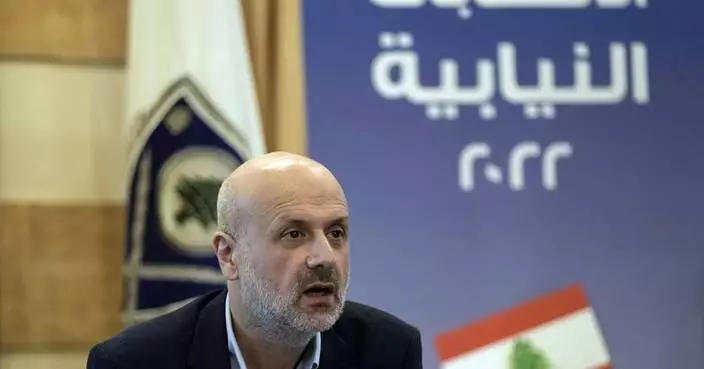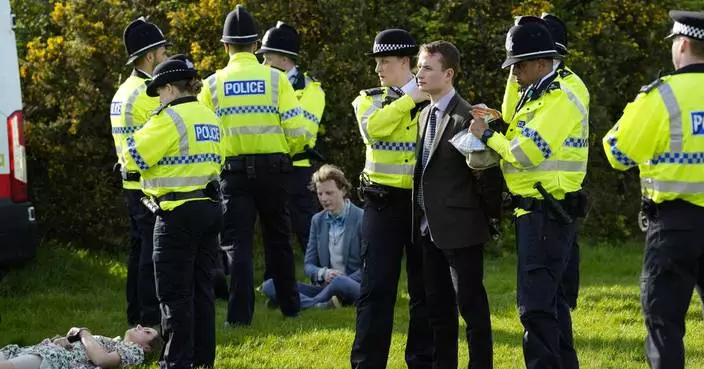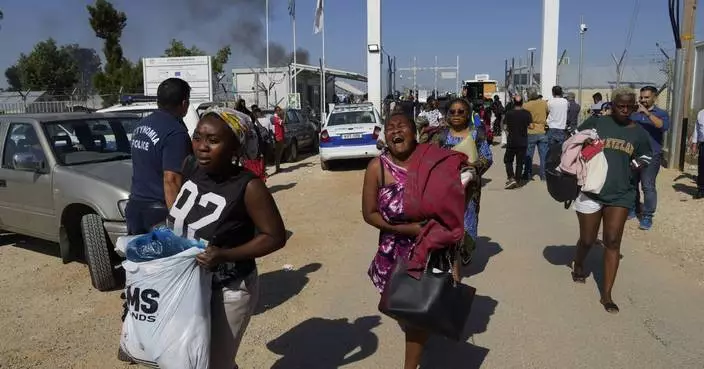Residents of Beirut awoke to a scene of utter devastation on Wednesday, a day after a massive explosion at the port sent shock waves across the Lebanese capital, killing dozens of people and wounding thousands.
Smoke was still rising from the port, where a towering grain silos had been shattered. Major downtown streets were littered with debris and damaged vehicles, and building facades were blown out. At hospitals across the city people had been waiting all night for news of loved ones who had gone missing or were wounded. Others posted requests for help online.
Click to Gallery
Residents of Beirut awoke to a scene of utter devastation on Wednesday, a day after a massive explosion at the port sent shock waves across the Lebanese capital, killing dozens of people and wounding thousands.
It was unclear what caused the blast, which appeared to have been triggered by a fire and struck with the force of an earthquake. It was the most powerful explosion ever seen in the city, which was on the front lines of the 1975-1990 civil war and has endured conflicts with neighboring Israel and periodic bombings and terror attacks.
Interior Minister Mohammed Fahmi told a local TV station that it appeared the blast was caused by the detonation of more than 2,700 tons of ammonium nitrate that had been stored in a warehouse at the dock ever since it was confiscated from a cargo ship in 2014.
“It was a real horror show. I haven’t seen anything like that since the days of the (civil) war,” said Marwan Ramadan, who was about 500 meters (yards) from the port and was knocked off his feet by the force of the explosion.
The port's major grain silo is run by the Lebanese Ministry of Economy and Trade. Drone footage shot Wednesday by The Associated Press showed that blast tore open those grain silos, dumping their contents into the debris and earth thrown up by the blast. Some 80% of Lebanon’s wheat supply is imported, according to the U.S. Agriculture Department.
Nehme said Lebanon also would import more wheat for its needs.
This photo shows a general view of the scene of an explosion that hit the seaport of Beirut, Lebanon, Wednesday, Aug. 5, 2020. A massive explosion rocked Beirut on Tuesday, flattening much of the city's port, damaging buildings across the capital and sending a giant mushroom cloud into the sky. (AP PhotoBilal Hussein)
This drone picture shows a destroyed restaurant near the scene of an explosion that hit the seaport of Beirut, Lebanon, Wednesday, Aug. 5, 2020. A massive explosion rocked Beirut on Tuesday, flattening much of the city's port, damaging buildings across the capital and sending a giant mushroom cloud into the sky. More than 70 people were killed and 3,000 injured, with bodies buried in the rubble, officials said. (AP PhotoHussein Malla)
Men look at the scene of an explosion that hit the seaport of Beirut, Lebanon, Wednesday, Aug. 5, 2020. A massive explosion rocked Beirut on Tuesday, flattening much of the city's port, damaging buildings across the capital and sending a giant mushroom cloud into the sky. (AP PhotoBilal Hussein)
This photo shows a general view of the scene of an explosion that hit the seaport of Beirut, Lebanon, Wednesday, Aug. 5, 2020. A massive explosion rocked Beirut on Tuesday, flattening much of the city's port, damaging buildings across the capital and sending a giant mushroom cloud into the sky. (AP PhotoBilal Hussein)
In this drone picture, the destroyed silo sits in rubble and debris after an explosion at the seaport of Beirut, Lebanon, Lebanon, Wednesday, Aug. 5, 2020. The massive explosion rocked Beirut on Tuesday, flattening much of the city's port, damaging buildings across the capital and sending a giant mushroom cloud into the sky. (AP PhotoHussein Malla)
Authorities said Tuesday that at least 70 people were killed and 3,000 wounded, with the toll likely to rise as more bodies are being pulled from the rubble.
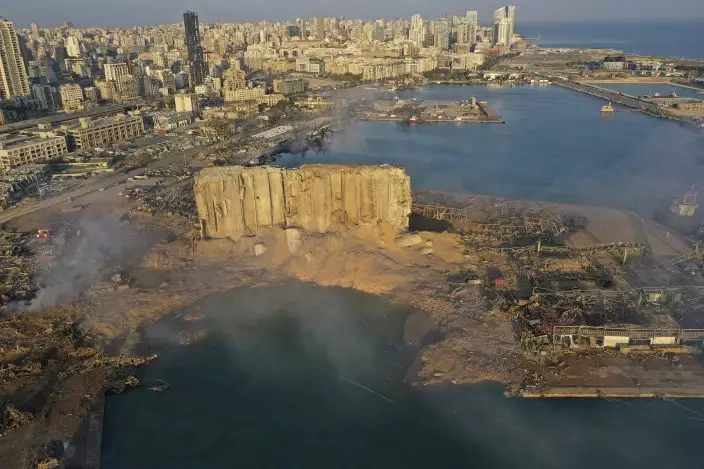
A drone picture shows the scene of an explosion that hit the seaport of Beirut, Lebanon, Wednesday, Aug. 5, 2020. A massive explosion rocked Beirut on Tuesday, flattening much of the city's port, damaging buildings across the capital and sending a giant mushroom cloud into the sky. (AP PhotoHussein Malla)
It was unclear what caused the blast, which appeared to have been triggered by a fire and struck with the force of an earthquake. It was the most powerful explosion ever seen in the city, which was on the front lines of the 1975-1990 civil war and has endured conflicts with neighboring Israel and periodic bombings and terror attacks.
“L’Apocalypse,” read the front page of Lebanon’s French L’Orient Le Jour newspaper. Another paper, al-Akhbar, had a photo of a destroyed port with the words: “The Great Collapse.”
Lebanon was already on the brink of collapse amid a severe economic crisis that has ignited mass protests in recent months. Its hospitals are confronting a surge in coronavirus cases, and there were concerns the virus could spread further as people flooded into hospitals.
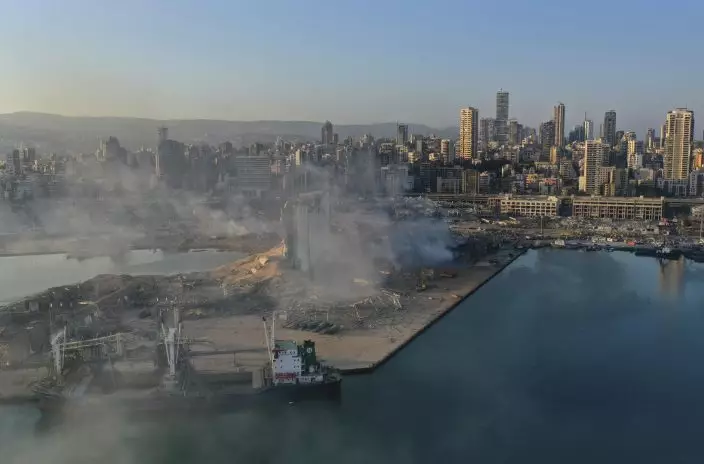
A drone picture shows smoke from the scene of an explosion at the seaport of Beirut, Lebanon, Wednesday, Aug. 5, 2020. A massive explosion rocked Beirut on Tuesday, flattening much of the city's port, damaging buildings across the capital and sending a giant mushroom cloud into the sky. (AP PhotoHussein Malla)
Interior Minister Mohammed Fahmi told a local TV station that it appeared the blast was caused by the detonation of more than 2,700 tons of ammonium nitrate that had been stored in a warehouse at the dock ever since it was confiscated from a cargo ship in 2014.
Witnesses reported seeing an orange cloud like that which appears when toxic nitrogen dioxide gas is released after an explosion involving nitrates.
Videos showed what looked like a fire erupting nearby just before, and local TV stations reported that a fireworks warehouse was involved. The fire appeared to spread to a nearby building, triggering the explosion, sending up a mushroom cloud and generating a shock wave.
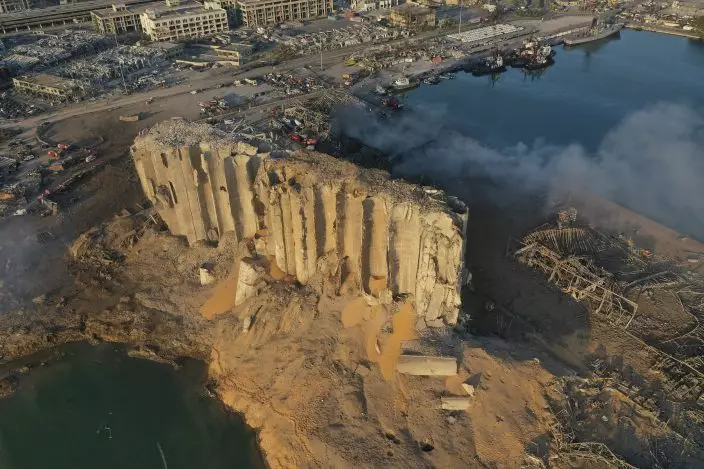
In this drone picture, the destroyed silo sits in rubble and debris after an explosion at the seaport of Beirut, Lebanon, Lebanon, Wednesday, Aug. 5, 2020. The massive explosion rocked Beirut on Tuesday, flattening much of the city's port, damaging buildings across the capital and sending a giant mushroom cloud into the sky. (AP PhotoHussein Malla)
“It was a real horror show. I haven’t seen anything like that since the days of the (civil) war,” said Marwan Ramadan, who was about 500 meters (yards) from the port and was knocked off his feet by the force of the explosion.
The blast destroyed numerous apartment buildings, potentially leaving large numbers of people homeless at a time when many Lebanese have lost their jobs and seen their savings evaporate because of a currency crisis. The explosion also raises concerns about how Lebanon will continue to import nearly all of its vital goods with its main port devastated.
There is also the issue of food security in Lebanon, a tiny country already hosting over 1 million Syrians amid that country’s yearslong war.
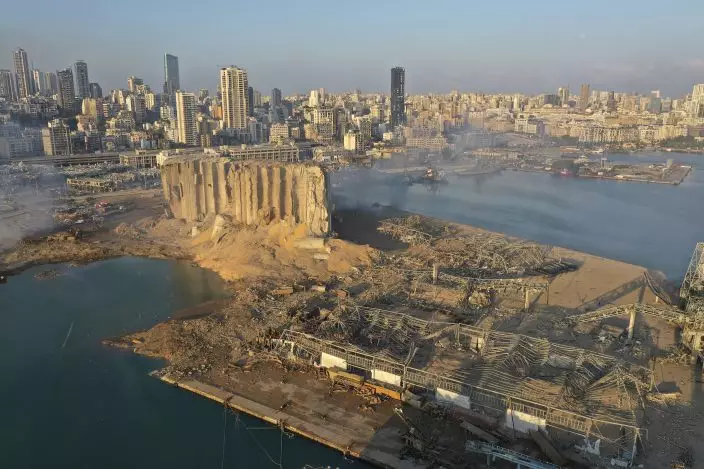
A drone picture shows the scene of an explosion that hit the seaport of Beirut, Lebanon, Wednesday, Aug. 5, 2020. A massive explosion rocked Beirut on Tuesday, flattening much of the city's port, damaging buildings across the capital and sending a giant mushroom cloud into the sky. (AP PhotoHussein Malla)
The port's major grain silo is run by the Lebanese Ministry of Economy and Trade. Drone footage shot Wednesday by The Associated Press showed that blast tore open those grain silos, dumping their contents into the debris and earth thrown up by the blast. Some 80% of Lebanon’s wheat supply is imported, according to the U.S. Agriculture Department.
Estimates suggest some 85% of the country’s grain was stored at the now-destroyed silos.
Lebanon’s state-run National News Agency quoted the Raoul Nehme, the minister of economy and trade, as saying that all the wheat stored at the facility had been “contaminated” and couldn’t be used. However, he insisted Lebanon had enough wheat for its immediate needs.
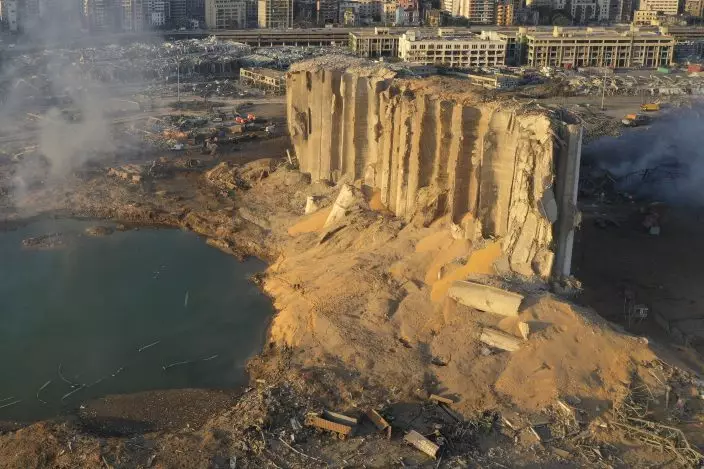
In this drone picture, the destroyed silo sits in rubble and debris after an explosion at the seaport of Beirut, Lebanon, Lebanon, Wednesday, Aug. 5, 2020. The massive explosion rocked Beirut on Tuesday, flattening much of the city's port, damaging buildings across the capital and sending a giant mushroom cloud into the sky. (AP PhotoHussein Malla)
Nehme said Lebanon also would import more wheat for its needs.
The tiny Mediterranean nation's economic crisis is rooted in decades of systemic corruption and poor governance by the political class that has ruled the country since the end of the civil war. Lebanese have held mass protests calling for sweeping political change since last autumn but few of their demands have been met as the economic situation has steadily worsened.
Associated Press writers Jon Gambrell in Dubai, United Arab Emirates, and Joseph Krauss in Jerusalem contributed to this report.
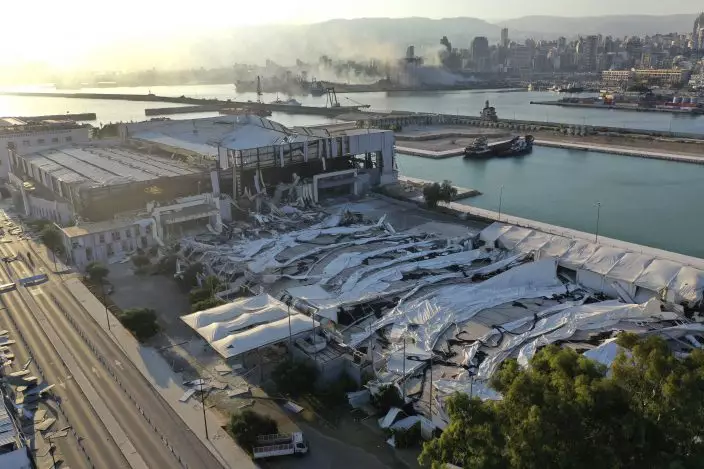
This drone pictures shows a destroyed events and exhibition hall near the scene of an explosion that hit the seaport of Beirut, Lebanon, Wednesday, Aug. 5, 2020. A massive explosion rocked Beirut on Tuesday, flattening much of the city's port, damaging buildings across the capital and sending a giant mushroom cloud into the sky. More than 70 people were killed and 3,000 injured, with bodies buried in the rubble, officials said. (AP PhotoHussein Malla)
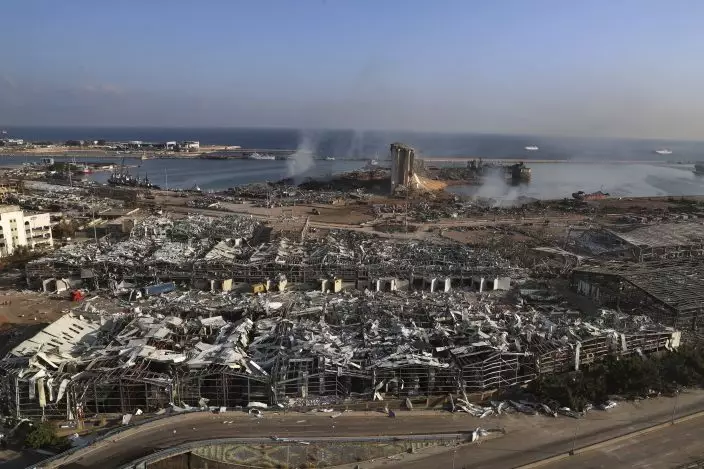
This photo shows a general view of the scene of an explosion that hit the seaport of Beirut, Lebanon, Wednesday, Aug. 5, 2020. A massive explosion rocked Beirut on Tuesday, flattening much of the city's port, damaging buildings across the capital and sending a giant mushroom cloud into the sky. (AP PhotoBilal Hussein)
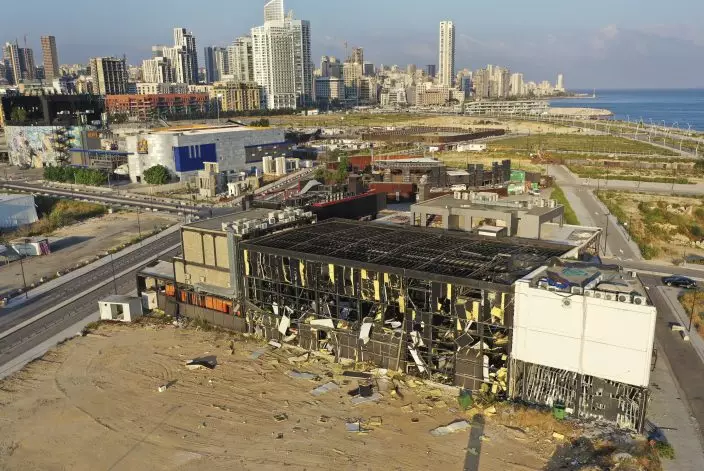
This drone picture shows a destroyed restaurant near the scene of an explosion that hit the seaport of Beirut, Lebanon, Wednesday, Aug. 5, 2020. A massive explosion rocked Beirut on Tuesday, flattening much of the city's port, damaging buildings across the capital and sending a giant mushroom cloud into the sky. More than 70 people were killed and 3,000 injured, with bodies buried in the rubble, officials said. (AP PhotoHussein Malla)
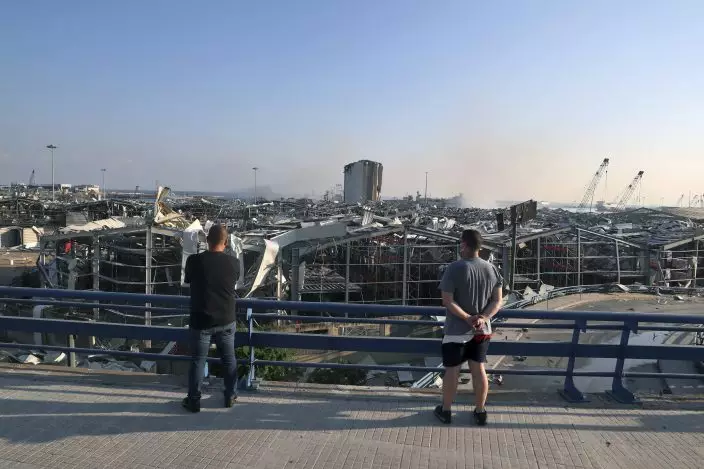
Men look at the scene of an explosion that hit the seaport of Beirut, Lebanon, Wednesday, Aug. 5, 2020. A massive explosion rocked Beirut on Tuesday, flattening much of the city's port, damaging buildings across the capital and sending a giant mushroom cloud into the sky. (AP PhotoBilal Hussein)
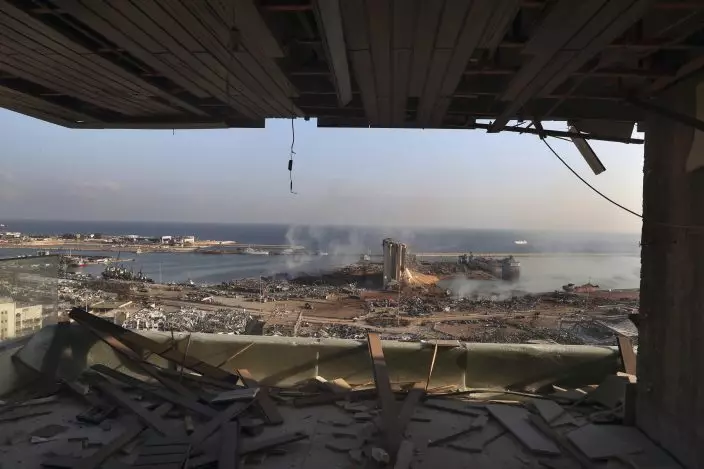
This photo shows a general view of the scene of an explosion that hit the seaport of Beirut, Lebanon, Wednesday, Aug. 5, 2020. A massive explosion rocked Beirut on Tuesday, flattening much of the city's port, damaging buildings across the capital and sending a giant mushroom cloud into the sky. (AP PhotoBilal Hussein)
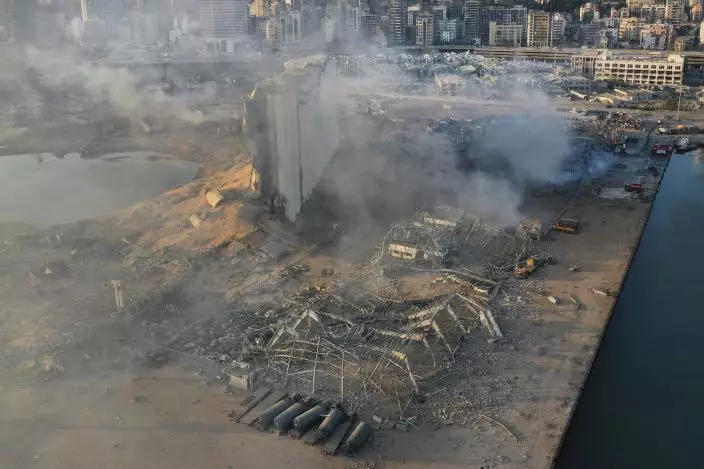
In this drone picture, the destroyed silo sits in rubble and debris after an explosion at the seaport of Beirut, Lebanon, Lebanon, Wednesday, Aug. 5, 2020. The massive explosion rocked Beirut on Tuesday, flattening much of the city's port, damaging buildings across the capital and sending a giant mushroom cloud into the sky. (AP PhotoHussein Malla)
BEIT MERI, Lebanon (AP) — Lebanon’s interior minister alleged Wednesday that the mysterious abduction and killing of a Hezbollah-linked Lebanese currency exchanger in a villa on the edge of a quiet mountain resort town earlier this month was likely the work of Israeli intelligence operatives.
The killing of Mohammad Srour, 57, who was sanctioned by the U.S., was like something out of an international spy thriller. Pistols equipped with silencers and gloves were found in a bucket of water at the scene, along with chemicals apparently intended to remove fingerprints and other evidence, Interior Minister Bassam Mawlawi said in an interview with The Associated Press. Thousand of dollars in cash were left scattered around Srour’s body, as if to dispel any speculation that robbery was the motive.
“Lebanese security agencies have suspicion or accusations that Mossad was behind this operation,” Mawlawi said, referring to the Israeli spy agency. “The way the crime was carried out led to this suspicion.”
He provided no specific evidence for his allegations. Mawlawi said the investigation is still ongoing and once it's over, the results will be made public and referred to judicial authorities.
The Israeli prime minister’s office, which oversees Mossad, did not immediately respond to a request for comment.
The suspicion by Lebanon’s security agencies that the crime could be the work of Israeli agents comes at a time when Lebanon’s southern border region has been rocked by ongoing clashes between militants of the Hamas-allied Hezbollah group and Israeli troops.
The U.S. Treasury sanctioned Srour in 2019 over his alleged money transfers from Iran through Hezbollah to the Palestinian militant group Hamas in the Gaza Strip.
“Mohammad Srour’s activity in money exchange is known, as are the transfers of money from which side to which side,” Mawlawi said.
Srour’s killing earlier this month, came as U.S. and Israeli officials have been trying to crack down on transfers of funds to Hamas. The push has intensified following the Oct. 7 Hamas-led attack on southern Israel that triggered the devastating war in Gaza and its ripple effects around the region.
Last month, a senior U.S. Treasury official visiting Beirut pressed Lebanese authorities to prevent funds from being funneled to Hamas through the tiny country. Jesse Baker, deputy assistant secretary of the Treasury for Asia and the Middle East in the Office of Terrorist Financing and Financial Crimes, met with top Lebanese political and financial officials.
Israel's military said it has killed a number of money exchangers in Gaza for allegedly funding Hamas.
Srour’s killing was clearly planned in advance. Three Lebanese judicial officials familiar with the investigation told the AP that a man posing as a customer had contacted Srour from abroad and asked him to deliver a cash transfer to a woman in the mountain resort of Beit Meri.
The officials, who spoke on condition of anonymity because the investigation is ongoing, said Srour first went with his nephew and left after handing the woman the money. He was contacted by the same person with another request a day after his first visit, the officials said. This time he went alone, after which his family lost contact with him.
Mawlawi said the cellphone the woman used to get in touch with Srour was only activated to contact him.
He said the perpetrators had first tried to rent an apartment in Beirut’s southeastern suburb of Hazmieh, a detail that has not been previously reported, but they later canceled, apparently because “they did not find (the apartment) suitable to carry out the operation."
Mawlawi said the killers then shifted to the quiet town of Beit Meri, famous for its posh homes with red-brick roofs, sprawling forest and Roman-era archaeological site, where they rented a three-story villa on the edge of the town using fake Lebanese identity cards. The General Security Directorate is looking into the identities of people who entered and left the country around the period of the killing, he said.
Srour went missing on April 3 in Beit Meri, and his body was found a week later in the villa. Mawlawi said investigators found “a large number of bullet” wounds in different parts of his body, including his arms and legs. He was reportedly handcuffed.
The villa is located on a quiet side street lush with trees.
“We did not hear anything,” said Christian Francis, who lives across the street from the villa where Srour was killed. He added that most people in the highly secured area have dogs, while municipal police have a checkpoint nearby and the Lebanese army has a post few hundred meters (yards) away.
Beit Meri’s mayor, Roy Abou Chedid, told the AP that the apartment was rented in late February to an unknown person for one year for $48,000. He added that the family that owns the villa did not register the rental contract at the municipality but had paid its municipal taxes on time in November.
“The operation was carried out in a way that is more than professional,” Abou Chedid said, adding that the neighbors did not suspect anything and it took security agencies some time to locate which house Srour’s body was in.
A Hezbollah spokesperson declined to comment on the killing citing the ongoing investigation. The spokesperson refused to say whether Srour was a Hezbollah member but said that he worked in the past for the al-Qard al-Hasan Association, the financial arm of the Iran-backed group.
Israel has a long history of targeted killings in Lebanon, including drone strikes that have killed high-ranking Hezbollah commanders over the past six months. At least 260 Hezbollah members have been killed by Israel in that period.
The U.S. has accused Srour of transferring tens of millions of dollars annually from Iran’s Islamic Revolutionary Guard Corps to Hamas’ military wing, the Qassam Brigades, alleging that starting in 2014, Srour “was identified as in charge of all money transfers” from the IRGC to the Qassam Brigades.
Srour’s family members have not given media interviews since his body was found but said in a televised statement that all his financial transactions were transparent and he simply worked in currency exchange. They urged security agencies to swiftly find the perpetrators.
During Srour’s funeral in his hometown of Labweh in northeast Lebanon, a Hezbollah flag was flown over his coffin and scores of men and women chanted “death to America and death to Israel” as they marched toward the cemetery.
Chehayeb reported from Beirut. Associated Press writer Josef Federman contributed to this report from Jerusalem.
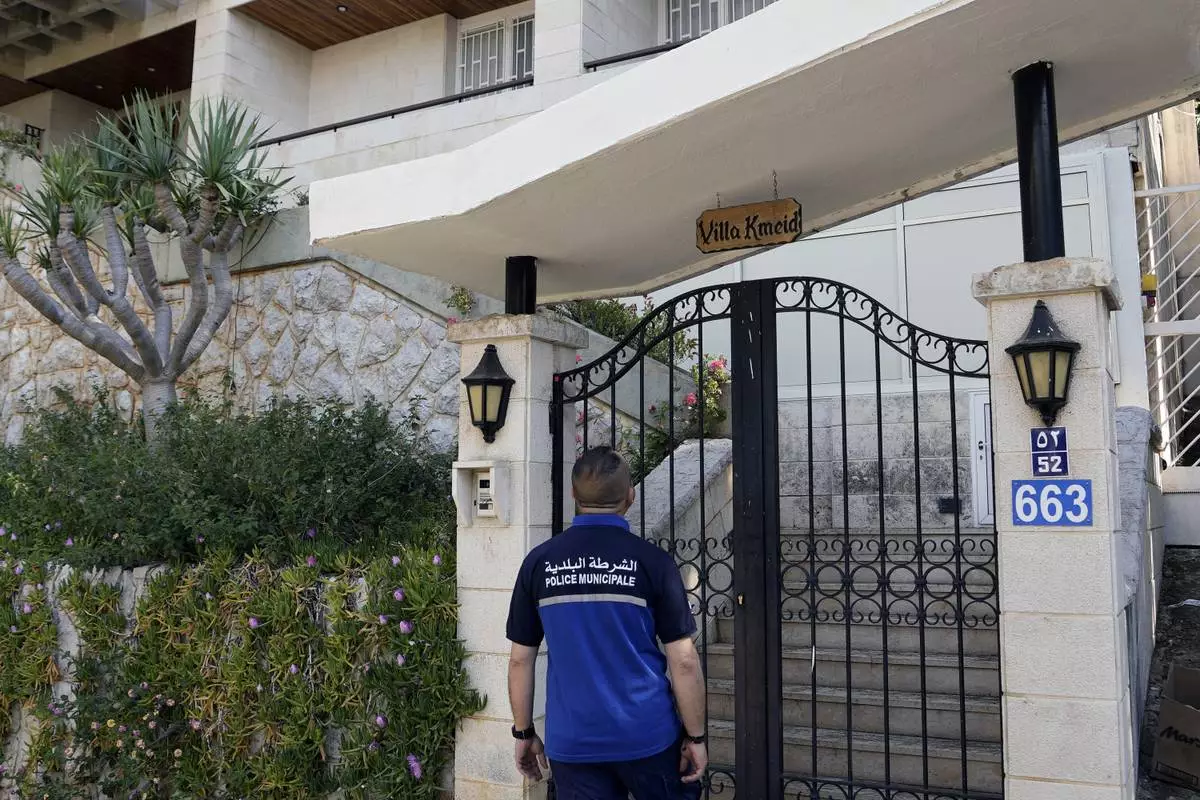
A municipal police officer stands outside a villa where the Lebanese money changer Mohammad Srour, 57, was found tortured and killed in Monte Verdi neighborhood of Beit Meri, Lebanon, Tuesday, April 16, 2024. Lebanon’s interior minister alleged Wednesday that the mysterious abduction and killing of a Hezbollah-linked Lebanese financier in a villa on the edge of a quiet mountain resort town earlier this month was likely the work of Israeli operatives. (AP Photo/Hassan Ammar)

Lebanese Interior Minister Bassam Mawlawi, speaks during an interview with the Associated Press at the interior ministry in Beirut, Lebanon, Tuesday, April 16, 2024. Lebanon’s interior minister alleged Wednesday that the mysterious abduction and killing of a Hezbollah-linked Lebanese financier in a villa on the edge of a quiet mountain resort town earlier this month was likely the work of Israeli operatives. (AP Photo/ Hassan Ammar)
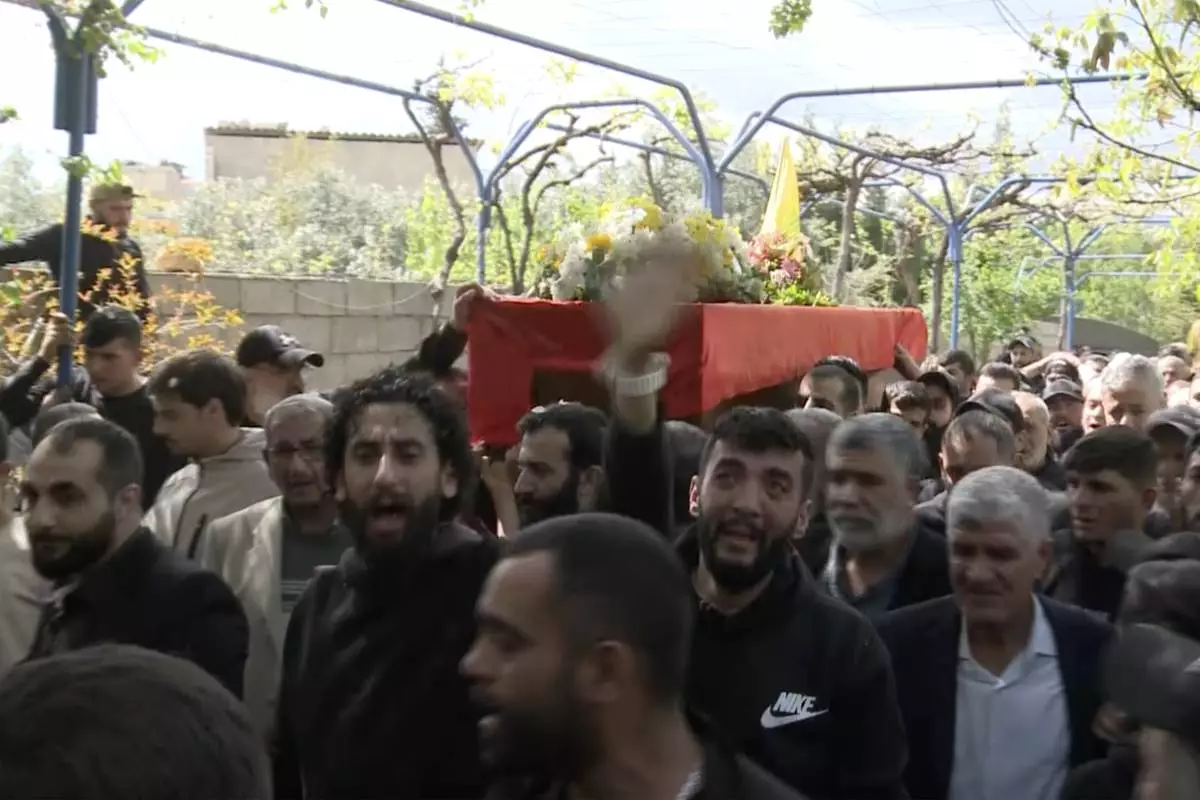
In this grab taken from video, mourners carry the coffin of Lebanese money changer Mohammad Srour, 57, who was found tortured and killed inside a villa in Monte Verdi neighborhood of Beit Meri, during his funeral procession in Labweh village, near the border with Syria, northeast Lebanon, Thursday, April 11, 2024. Lebanon’s interior minister alleged Wednesday that the mysterious abduction and killing of a Hezbollah-linked Lebanese financier in a villa on the edge of a quiet mountain resort town earlier this month was likely the work of Israeli operatives. (AP Photo)
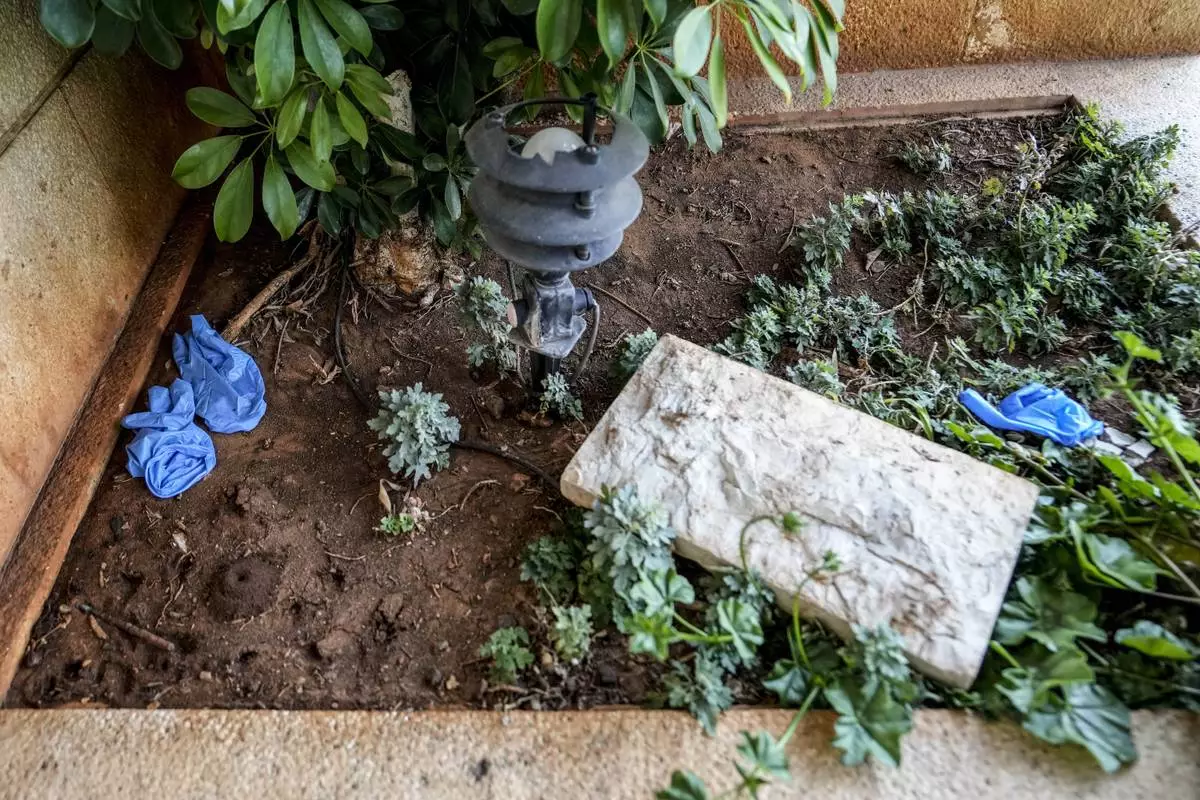
Medical gloves sit outside a villa where money changer Mohammad Srour, 57, was found tortured and killed in Monte Verdi neighbourhood of Beit Meri, Lebanon, Tuesday, April 16, 2024. Lebanon’s interior minister alleged Wednesday that the mysterious abduction and killing of a Hezbollah-linked Lebanese financier in a villa on the edge of a quiet mountain resort town earlier this month was likely the work of Israeli operatives. (AP Photo/Hassan Ammar)
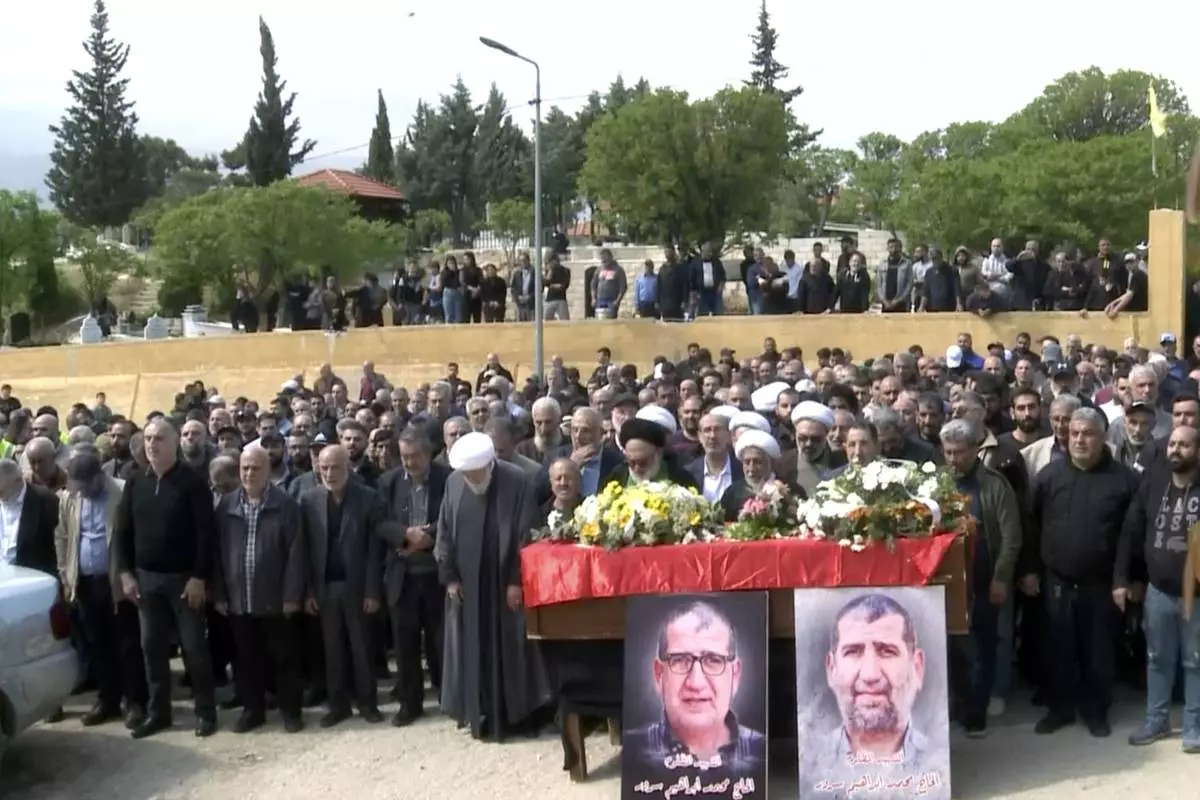
In this grab taken from video, mourners pray over the coffin of Lebanese money changer Mohammad Srour, 57, who was found tortured and killed inside a villa in Monte Verdi neighborhood of Beit Meri, during his funeral procession in Labweh village, near the border with Syria, northeast Lebanon, Thursday, April 11, 2024. Lebanon’s interior minister alleged Wednesday that the mysterious abduction and killing of a Hezbollah-linked Lebanese financier in a villa on the edge of a quiet mountain resort town earlier this month was likely the work of Israeli operatives. (AP Photo)
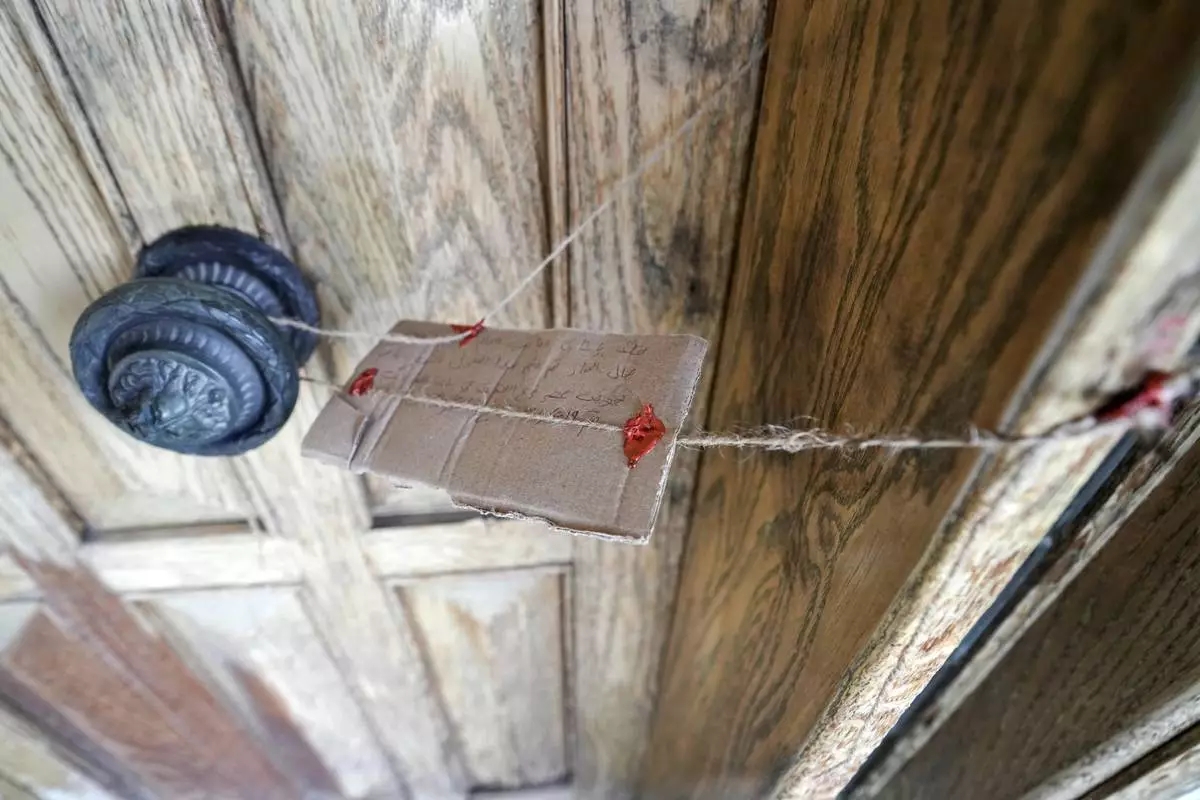
Lebanese authorities sealed the main door of a villa where money changer Mohammad Srour, 57, was found tortured and killed in Monte Verdi neighbourhood of Beit Meri, Lebanon, Tuesday, April 16, 2024. The mysterious abduction and murder of a United States-sanctioned Lebanese money changer in a three-story villa on the edge of a quiet mountain resort town overlooking Beirut was most likely the work of Israeli operatives, Lebanon's interior minister said Wednesday. (AP Photo/Hassan Ammar)

Municipal police officers patrol outside a villa where the Lebanese money changer Mohammad Srour, 57, was found tortured and killed in Monte Verdi neighbourhood of Beit Meri, Lebanon, Tuesday, April 16, 2024. Lebanon’s interior minister alleged Wednesday that the mysterious abduction and killing of a Hezbollah-linked Lebanese financier in a villa on the edge of a quiet mountain resort town earlier this month was likely the work of Israeli operatives. (AP Photo/Hassan Ammar)






















